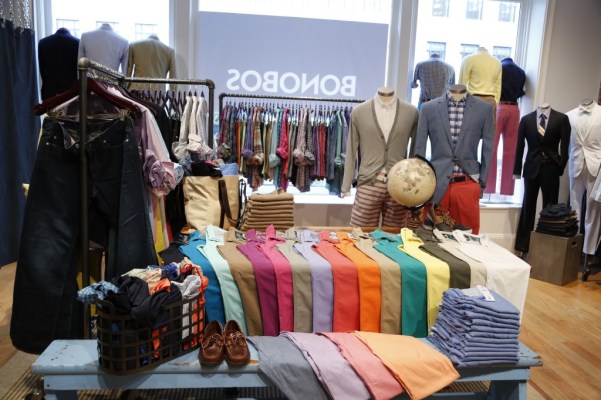Curebit, an e-commerce startup that has built its business around optimizing and tracking word-of-mouth referrals for customers like Bonobos, Restaurant.com, Jawbone, True & Co., and others, is now stepping into the world of offline brick-and-mortar commerce with a new solution it’s calling “Retail Referrals.” This new in-store program, being trialed in a half-dozen Bonobos “Guideshop” locations, encourages shoppers to “tell a friend” about their purchase after checkout in order to earn additional store credit if the friend buys using the provided discount code.
Despite a rough start, Curebit now has a couple thousand customers including about 18 enterprise customers worldwide using its solutions, which have historically been focused on driving and tracking referrals for e-commerce businesses. The company drove up to 25 percent of new customers for Bonobos during referral campaigns in 2012, and helped the retailer change its referral strategy from Facebook to email, which Curebit found was converting better.
Now the plan is to help retailers marry their offline operations with online — two channels that are often at war with each other within these organizations.
“This is very applicable to major, classic ‘old-school’ retailers right now, which are very concerned with the transition [from offline to online]. A lot their sales are still happening offline right now — 90 to 95 percent,” explains Curebit’s co-founder and CEO Allan Grant. “And in a lot of ways, they’re basically fighting between their offline and online channels.”
The new Retail Referrals program could help retailers use their heavy offline traffic to support their online operations, and vice versa. Trials are now underway at all six Bonobos Guideshop locations. (Its Guideshops are stores where people can try on the clothing in real life, then purchase items in-store via iPads using Bonobos’ e-commerce site). These include New York, Bethesda, Chicago, D.C., San Francisco and Boston locations.
After checkout, the store clerk explains how the referral program works, and asks the customer if they would like to share an offer with friends via email. They can then do so directly on the iPad.
Of course, most major retailers don’t have iPads at point-of-sale (well, yet?), but the system can be customized through Point-of-Sale integrations which could have a URL printed on receipts, for example, or could include codes emailed to customers after first collecting their information at checkout.
The promotions offered are up the retailer, but Curebit is heavily involved in that process, having transitioned away from being a pure technology play to something of an agency model where it helps retailers with everything from copywriting to design for the promotions to assistance in understanding what types of promotions will work for that business and why.
Its offline referrals system is flexible enough, allowing customers to give discounts to friends through SMS, email, social media, or even just providing them with special discount codes or short URLs they can share as needed.
While in the Bonobos experiment, it’s likely going to work fairly well, given the heavy technology presence with in-store iPads, a salesforce whose main goal is to support an e-commerce website, and the company’s close working relationship with Curebit, in more traditional retail stores, having salespeople tell shoppers, “oh hey, there’s something on your receipt,” for example, hasn’t always been too successful – just ask those running post-purchase surveys that tend to have low single-digit response rates at best.
Still, with surveys, there’s often no benefit to the customer, not to mention that surveys are tedious and time-consuming. Giving a friend a discount that could later pay off in the form of store credit is something that the team at Curebit thinks consumers will be more likely to do.
“It doesn’t feel like a coupon code, it feels like free money,” says Grant of the promotions the stores will offer their customers. “Here, you feel like you’ve earned it – your friend bought, you got this as a reward. This is valuable,” he adds.
The offline referrals program is a high-level, enterprise offering and will be priced depending on integration requirements and other factors beginning around $30,000 per month.
